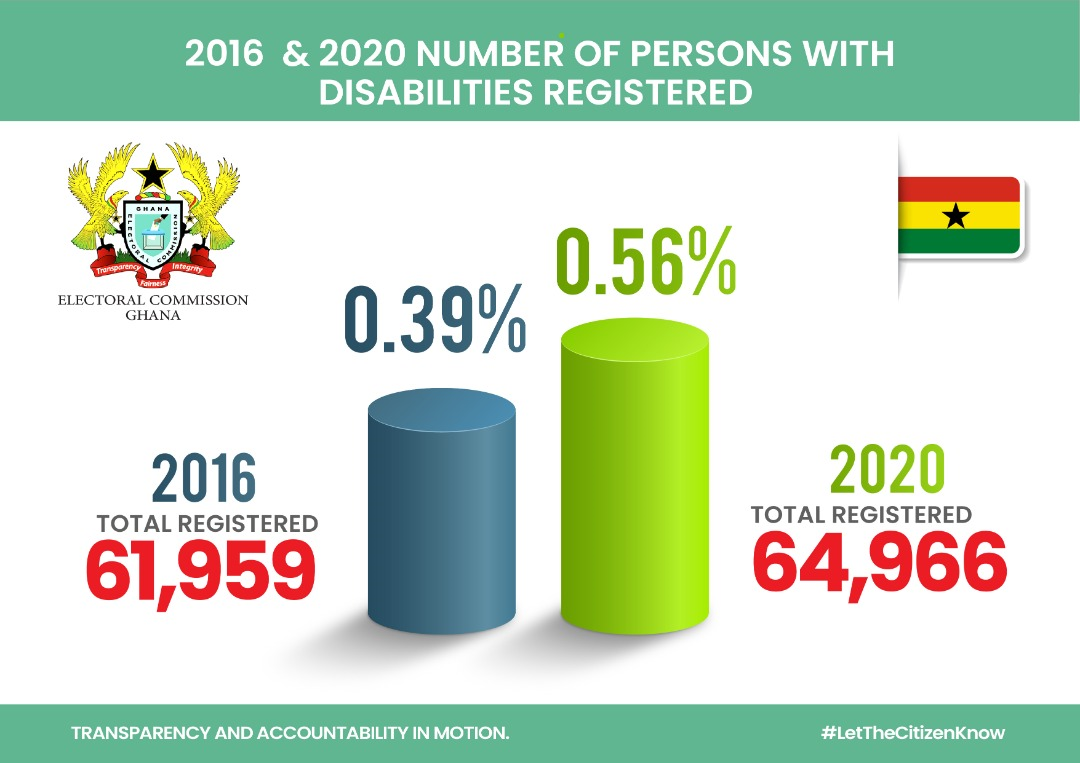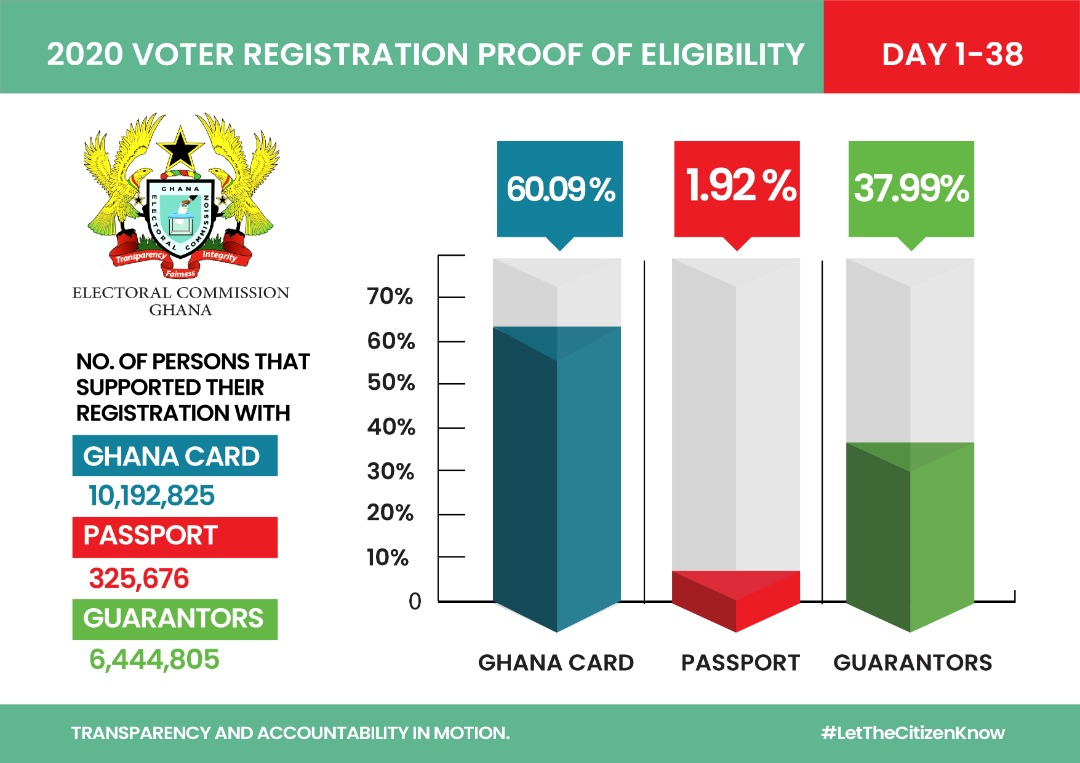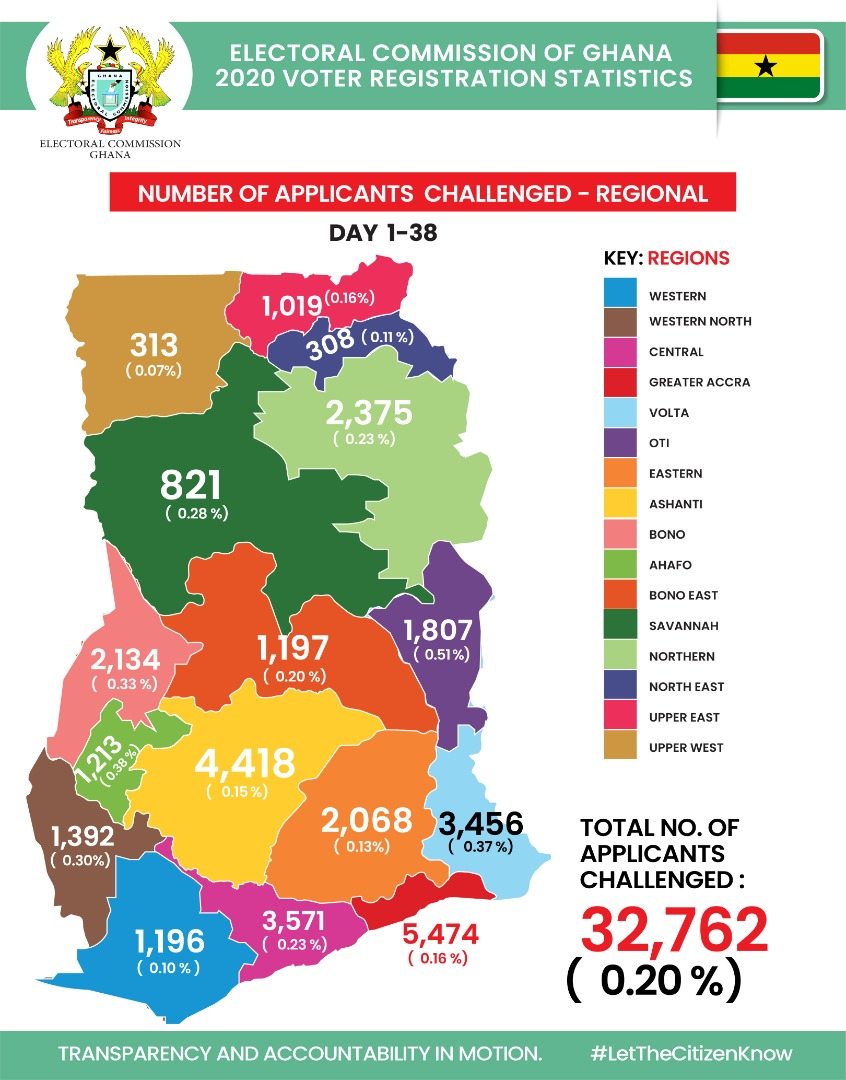
EC confident of credible register; 16,963,306 voters registered
The Electoral Commission (EC) has given a firm assurance that it is on track to conduct the December 7, 2020 polls with nothing but a clean and credible register.
The commission has provisionally registered 16,963,306 people at the end of the biometric voter registration exercise which ended on August 9, this year, exceeding its 15 million target.
Advertisement
Presenting updates on the registration exercise at the 9th edition of the “Let the Citizens Know series” Wednesday, the Chairperson of the EC, Mrs Jean Mensa, said the eligibility of 37,762 applicants had been challenged for various reasons, mainly bordering on nationality.
However, she said the commission had put in place watertight mechanisms to thoroughly rid the register of unqualified persons, including foreigners and minors.
"We are mindful of the infiltration of foreigners at a number of our registration centres. Additionally, we are aware that a number of minors have found their way into the register; but we are confident that the challenge process initiated at all districts throughout the country will unearth these illegal persons and rid the register of unqualified persons.”
"We are confident that the register that will be used for the 2020 elections will be a wholly-owned Ghanaian enterprise, reflecting qualified Ghanaians only," she stressed.
Adjudication
The EC has already inaugurated a voter registration adjudication committee to help expunge the names of multiple registrants from the voters register.
The 16-member multi-stakeholder committee, which was inaugurated by the Chairperson of the EC on Wednesday, August 5, this year, are to manually determine the eligibility of persons who have been flagged for multiple registration through the de-duplication process to be on the voter roll.
The committee was constituted in compliance with Regulations 27 of the Public Elections (registration of voters) Regions, 2016 which states that "the Commission shall certify the register after determination of claims of objection."
According to Regulation 27(2), the procedure for certifying the register includes:
(a)“matching of fingerprints in the database of the commission by automatic fingerprint identification system;
(b)“examination of facial and personal data of all applications with multiple registrations by an adjudication supervisor of the commission;
(c)“confirmation or rejection of a registered voter by an adjudication supervisor of the commission.
As part of processes to determine the eligibility of challenged applicants, the EC has also activated processes through the District Review Committees to sit on the challenged names on a case by case basis.
Total registration
Providing updates on the registration exercise, Mrs Mensa said the EC had provisionally registered 16,963,306 persons at the end of the entire voter registration exercise.
She said 16,932,492 people were registered at the end of the mass registration exercise across the country, with an additional 30,814 registrants captured during the two-day mop-up exercise.
The EC chairperson disclosed that 8,775,609 females were registered, representing 51.73 per cent of the total registrants, while the remaining 8,187,689, representing 48.27 per cent were males.
Regional breakdown
On the regional breakdown of the figures, the Greater Accra Region led with 3,509,805 registrants while the Ashanti Region followed with 3,013,856.
The four other regions which recorded figures above a million were the Eastern, 1,628,180; Central, 1,566,06; Western, 1,185,315 and Northern, 1,047,539.
The Volta Region fell marginally below the 1 million mark after recording 929,322 registrants.
Three other regions with figures above the half a million mark are the Upper East, 653,730; Bono, 648,408 and the Bono East 592,015.
The Upper West Region followed with 470,271 registrants while the Western North and Oti regions had 465,444 and 353,492 registrants respectively.
The Ahafo, Savannah and North East regions completed the list with 315,827; 295,648 and 288,393 registrants respectively.
First-time registrants
Additionally, Mrs Mensa said 762, 944 first-time registrants, defined as persons who turned 18 years during the registration exercise, were also registered at the end of the exercise.
When added to the 612,104 19-year-olds that were also captured, it brings the total number of persons below 20 years to 1,375,048, representing 8.1 per cent of the total registrants.
Mrs Mensa also indicated that 64,966 persons with disability (PWDs) were registered, constituting 0.56 per cent of the total registrants.
Guarantor system
Touching on the type of documents used to prove citizenship for the registration, the EC chairperson said 60.9 per cent of the registrants used the Ghana card, while 37.99 per cent and 1.92 per cent used the guarantor system and Ghanaian passport respectively.
She said the three regions where applicants used the Ghana card most were the Oti, 79.1 per cent; Eastern, 78.5 per cent, and the Western North with 76.9 per cent.
“Regarding the use of guarantors, the Bono East Region recorded the highest use of the guarantor system with 58.5 per cent registering with guarantors. It is followed by the Bono and Ahafo regions, which both had 57.7 per cent of the registered population using the guarantor system,” she said.
Fingerprints
Mrs Mensa further indicated that 61,995 persons were registered without fingerprints, representing 0.37 of the total number of persons registered.
She explained that when those applicants presented themselves to be registered, they had lost their fingerprints largely because of the nature of the work they were engaged in.
The figures showed that the Upper East Region had the highest number of that class of registrants, having recorded 9,244 names without fingerprints, while Ahafo Region had the lowest figure of 813 persons.
“These applicants will be verified on election day using our facial recognition system,” she indicated.
Challenged cases
On the issue of the 37,762 applicants whose eligibility had been challenged, the EC boss indicated that the regional breakdown of the challenged cases would be made available later, but added that most of the cases were from the border regions.
“From the data, one can observe that the Oti Region had the highest
number of challenged cases per population with 0.51 per cent of registrations being challenged. This is followed by the Ahafo Region where 0.38 per cent were challenged and then the Volta Region, with 0.37 per cent challenged registered names,” Mrs Mensa said.
Collaboration
The EC chairperson commended the security agencies, the media, civil society organisations (CSOs) and other stakeholders who played key roles to ensure the successful conduct of the voter registration exercise.
She called for such collaboration to be deepened ahead of the December 7 elections to ensure that polls were free, fair and transparent.
Mrs Mensa said the commission would soon announce a calendar for the rest of its activities, including the date for the exhibition of the register.
Background
The mass voter registration exercise started on June 30, after an initial setback occasioned by vehement resistance from some political parties and CSOs.
The outbreak of the coronavirus disease (COVID-19) made things more difficult for the EC to compile the register on the March 28 initial date for the exercise.
The commission started compiling the register on June 30, this year and ended the main registration on August 6, this year.
A two-day mop-up was also carried out on August 8 and August 9, this year to give opportunity to eligible Ghanaians who were unable to register in the main exercise to do so.
#GhanaVotes2020
Watch the video below;














